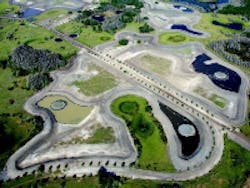WaterWorld Weekly Newscast, June 26, 2017
The following is a transcript of the WaterWorld Weekly Newscast for June 26, 2017.
Hi, I'm Angela Godwin for WaterWorld magazine, bringing you water and wastewater news headlines for the week of June 26. Coming up...
New York high school students win 2017 U.S. Stockholm Junior Water Prize
Water-meter hacker sentenced to prison time
Sewage continues to flow into Mississippi River from sewer line break
Florida water reuse project designed by CH2M wins accolades
Rachel Chang and Ryan Thorpe of Manhasset, N.Y., are the 2017 winners of the United States Stockholm Junior Water Prize, the most prestigious youth award for a water-related research project.
Their winning paper, “A Novel Approach to Rapidly and Sensitively Detect and Purify Water Contaminated with Shigella, E. coli, Salmonella, and Cholera,” highlights that waterborne diseases cause 3.4 million deaths annually.
Chang and Thorpe’s winning project involved the development of an efficient and rapid method to detect minute levels of bacteria and purify the water of pathogens.
Chang and Thorpe will go on to represent the United States at the international Stockholm Junior Water Prize competition during World Water Week in Stockholm, Sweden, in August.
A former radio frequency technician from Montgomery County, Pa., will spend a year and a day in prison for hacking into systems controlling water meters and disabling them.
After being terminated from his job with a company that made remote meter readers, Adam Flanagan used his knowledge of the remote meter reading system to gain access through the Internet.
His actions disrupted water utility business operations and caused inaccuracies in billing data.
In March, Flanagan pleaded guilty to two counts of unauthorized access to a protected computer.
Just north of St. Louis, a breach in a sewer pipe is sending about 2 million gallons of raw sewage into the Mississippi River each day.
The break occurred on May 9 but officials say that because of its proximity to a levee, it can't be fixed until water levels recede.
Metro East Sanitary District said it's standing by and ready to make repairs as soon as the river drops.
Illinois American Water has a drinking water intake about 2.5 miles downstream from the break, but says the sewage is significantly diluted by the time it reaches the intake.
Nonetheless, the utility is monitoring water quality and testing throughout the treatment process.
The Florida Water Environment Association recently chose the Central Pasco County Beneficial Water Reuse Project, the 4G Wetlands, as its 2016 David W. York Water Reuse Project of the Year Award winner.
The 4G Wetlands is a multifunctional project addressing decades-long concerns regarding groundwater drawdowns in areas affected by public water supply wellfields.
Nearing completion, the 4G Wetlands consist of a 175-acre groundwater recharge wetland system constructed on uplands pastures.
The system is sized to receive 5 million gallons per day of reclaimed water to passively recharge the surficial and Upper Floridan aquifers, while protecting water quality.
Since 2010, CH2M, alongside Pasco County Utilities and the Southwest Florida Water Management District, has provided a full-range of design, permitting and services during construction for the project.
Pasco County Project Manager Jeffrey Harris said the innovative reclaimed water project "facilitates a more holistic watershed management approach," and will "provide for a more sustainable water supply for the 2.5 million people of the Tampa Bay region.
He added that it's "an example of how to better manage all freshwater resources."
For WaterWorld magazine, I'm Angela Godwin. Thanks for watching.
